| Listing 1 - 9 of 9 |
Sort by
|
Book
ISBN: 1647121116 9781647121112 1647121094 1647121108 Year: 2021 Publisher: Washington, DC : Georgetown University Press,
Abstract | Keywords | Export | Availability | Bookmark
 Loading...
Loading...Choose an application
- Reference Manager
- EndNote
- RefWorks (Direct export to RefWorks)
"Approaches to Discourse Analysis lends insights into micro-linguistic strategies, multimodality, meaning making, relationship and identity negotiation, ideological constructions, cultural practices, and our social worlds. The approaches employed in the eleven chapters are qualitative and quantitative; involve categorizing tokens and turn-by-turn analysis; use a range of transcription conventions; analyze speech, embodied communication, and online texts and images; differently rely on ethnographic and participants' own interpretive insights; and differ in myriad other subtle and not-so-subtle ways. The chapters analyze discourse in multiple languages, across multiple contexts, and in multiple modes. Collectively, they highlight the diversity and complexity of the field in terms of methods of data collection, topical foci, and analytic procedures, while emphasizing a unified goal of understanding communication as fundamentally connected to human agency and creativity, as co-constructed, and as embedded in and constitutive of our social and cultural worlds. Approaches to Discourse Analysis demonstrates the importance of the diverse perspectives that various approaches to discourse bring to bear on human communication, while also providing readers a window to the branches of our discipline, and how they diverge, intertwine, and blossom"--
Book
ISBN: 1589016742 1589016297 9781589016743 9781589016293 Year: 2010 Publisher: Washington, DC : Georgetown University Press,
Abstract | Keywords | Export | Availability | Bookmark
 Loading...
Loading...Choose an application
- Reference Manager
- EndNote
- RefWorks (Direct export to RefWorks)
Narratives are fundamental to our lives: we dream, plan, complain, endorse, entertain, teach, learn, and reminisce through telling stories. They provide hopes, enhance or mitigate disappointments, challenge or support moral order and test out theories of the world at both personal and communal levels. It is because of this deep embedding of narrative in everyday life that its study has become a wide research field including disciplines as diverse as linguistics, literary theory, folklore, clinical psychology, cognitive and developmental psychology, anthropology, sociology, and history.In Telli
Discourse analysis, Narrative --- Narration (Rhetoric) --- Storytelling --- Sociolinguistics --- Psycholinguistics --- Story-telling --- Telling of stories --- Narrative discourse analysis --- Oral interpretation --- Children's stories --- Folklore --- Oral interpretation of fiction --- Performance --- Conferences - Meetings --- Language and culture --- Linguistics --- Sociology --- Integrational linguistics (Oxford school) --- Rhetoric --- Narratees (Rhetoric)
Book

ISBN: 1626161534 9781626161535 9781626161528 1626161526 Year: 2014 Publisher: Washington, District of Columbia : Georgetown University Press,
Abstract | Keywords | Export | Availability | Bookmark
 Loading...
Loading...Choose an application
- Reference Manager
- EndNote
- RefWorks (Direct export to RefWorks)
People in many African communities live within a series of concentric circles when it comes to language. In a small group, a speaker uses an often unwritten and endangered mother tongue that is rarely used in school. A national indigenous language-written, widespread, sometimes used in school-surrounds it. An international language like French or English, a vestige of colonialism, carries prestige, is used in higher education, and promises mobility-and yet it will not be well known by its users. The essays in Languages in Africa explore the layers of African multilingualism as they affect lang
African languages --- Language policy --- Native language and education --- Multilingualism --- Glottopolitics --- Institutional linguistics --- Language and languages --- Language and state --- Languages, National --- Languages, Official --- National languages --- Official languages --- State and language --- Communication policy --- Language planning --- Native language --- Education --- Language and education --- Plurilingualism --- Polyglottism --- Social aspects --- Government policy --- Use in schools --- Language policy. --- Multilingualism. --- Native language and education. --- Social aspects. --- Africa.
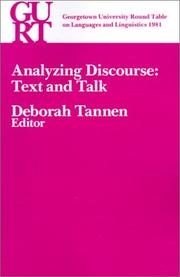
ISBN: 0878401164 9780878401161 Year: 1982 Publisher: Washington (D.C.): Georgetown university press,
Abstract | Keywords | Export | Availability | Bookmark
 Loading...
Loading...Choose an application
- Reference Manager
- EndNote
- RefWorks (Direct export to RefWorks)
Linguistics --- Literary rhetorics --- Pragmatics
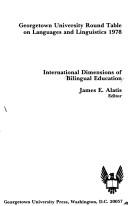
ISBN: 087840113X 9780878401130 Year: 1978 Publisher: Washington (D.C.): Georgetown university press,
Abstract | Keywords | Export | Availability | Bookmark
 Loading...
Loading...Choose an application
- Reference Manager
- EndNote
- RefWorks (Direct export to RefWorks)
Didactics of languages --- Education, Bilingual --- Bilingualism --- Dialectology --- Language and languages --- Study and teaching --- -Bilingualism --- -Dialectology --- -Language and languages --- -Foreign languages --- Languages --- Anthropology --- Communication --- Ethnology --- Information theory --- Meaning (Psychology) --- Philology --- Linguistics --- Dialects --- Languages in contact --- Multilingualism --- Bilingual education --- Multilingual education --- Congresses --- -Congresses --- Education, Bilingual - Congresses --- Bilingualism - Congresses --- Dialectology - Congresses --- Language and languages - Study and teaching - Congresses
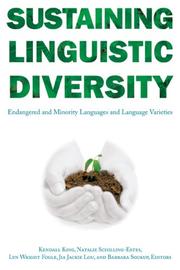
ISBN: 1461913748 1589014162 1589011929 9781461913740 9781589014169 9781589011922 Year: 2008 Publisher: Washington, D.C. : Georgetown University Press,
Abstract | Keywords | Export | Availability | Bookmark
 Loading...
Loading...Choose an application
- Reference Manager
- EndNote
- RefWorks (Direct export to RefWorks)
In the last three decades the field of endangered and minority languages has evolved rapidly, moving from the initial dire warnings of linguists to a swift increase in the number of organizations, funding programs, and community-based efforts dedicated to documentation, maintenance, and revitalization. Sustaining Linguistic Diversity brings together cutting-edge theoretical and empirical work from leading researchers and practitioners in the field. Together, these contributions provide a state-of-the-art overview of current work in defining, documenting, and developing the world's smaller lang
Language attrition. --- Linguistic minorities. --- Language revival. --- Language policy. --- Glottopolitics --- Institutional linguistics --- Language and languages --- Language and state --- Languages, National --- Languages, Official --- National languages --- Official languages --- State and language --- Language renewal --- Language revitalization --- Renewal, Language --- Restoration of languages --- Revitalization, Language --- Revival of languages --- Minority languages --- Language loss --- Government policy --- Restoration --- Revival --- Language policy --- Language revival --- Linguistic minorities --- Language attrition --- Bilingualism --- Sociolinguistics --- Communication policy --- Language planning --- Minorities --- Political aspects
Book
Year: 1967 Publisher: Washington (D.C.): Georgetown university press,
Abstract | Keywords | Export | Availability | Bookmark
 Loading...
Loading...Choose an application
- Reference Manager
- EndNote
- RefWorks (Direct export to RefWorks)
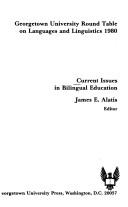
ISBN: 0878401156 9780878401154 Year: 1980 Publisher: Washington (D.C.): Georgetown university press,
Abstract | Keywords | Export | Availability | Bookmark
 Loading...
Loading...Choose an application
- Reference Manager
- EndNote
- RefWorks (Direct export to RefWorks)
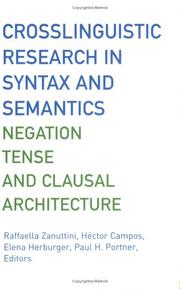
ISBN: 9781589010802 1589010809 1589013050 1435627458 9781435627451 9781589013056 Year: 2006 Volume: *1 Publisher: Washington: Georgetown university press,
Abstract | Keywords | Export | Availability | Bookmark
 Loading...
Loading...Choose an application
- Reference Manager
- EndNote
- RefWorks (Direct export to RefWorks)
Presenting cutting-edge research in syntax and semantics, this important volume furthers theoretical claims in generative linguistics and represents a significant addition to present scholarship in the field. Leading scholars present crosslinguistic studies dealing with clausal architecture, negation, and tense and aspect, and the issue of whether a statistical model can by itself capture the richness of human linguistic abilities. Taken together, these contributions elegantly show how theoretical tools can propel our understanding of language beyond pretheoretical descriptions, especially whe
Grammar, Comparative and general --- Semantics --- Clauses --- Negatives --- Tense --- Syntax --- Comparative grammar --- Grammar --- Grammar, Philosophical --- Grammar, Universal --- Language and languages --- Philosophical grammar --- Linguistics --- Philology --- Grammar, Comparative --- Grammar, Comparative and general - Clauses - Congresses. --- Grammar, Comparative and general - Negatives - Congresses. --- Grammar, Comparative and general - Tense - Congresses. --- Grammar, Comparative and general - Syntax - Congresses. - Semantics - Congresses. --- Grammar, Comparative and general - Semantics
| Listing 1 - 9 of 9 |
Sort by
|

 Search
Search Feedback
Feedback About UniCat
About UniCat  Help
Help News
News